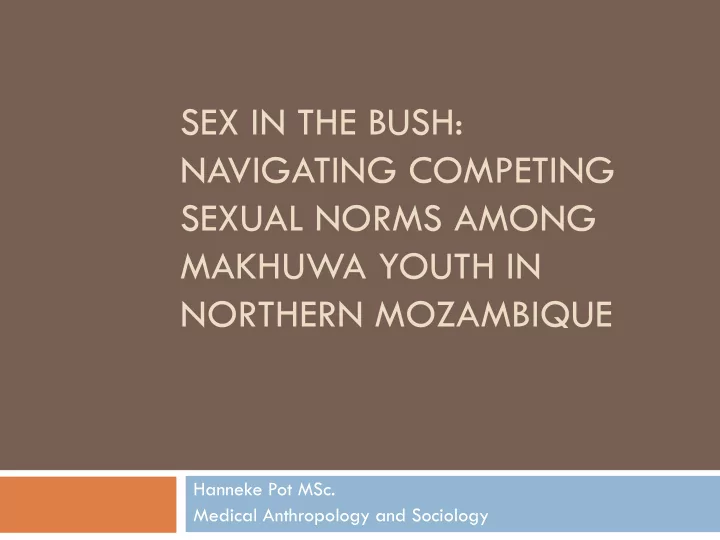

SEX IN THE BUSH: NAVIGATING COMPETING SEXUAL NORMS AMONG MAKHUWA YOUTH IN NORTHERN MOZAMBIQUE Hanneke Pot MSc. Medical Anthropology and Sociology
Introduction Study site Nanatha – coastal, Islamic, matrilineal village in northern Mozambique Eco-lodge Anan Clinica Focus: youth sexuality and HIV
Methods Ethnographic Participatory Action Research with local youth Focus on research Phase I: focus on Anan Clinica, perceived problems sexuality and youth Phase II: 5 girls and 8 boys, age 10-19, group meetings 2/3 times a week, individual interviews
PAR Free listing Story writing – what do you want to change? Discussing topics based on stories Drawing a map of the village
Free listing Finding the right words to talk about premarital sexuality International discourse and ‘local’ discourse Sexualidade, mothelani/othelana/othelána, mararuwo / oraruwa? Nkahimani ipalavra simpuanhanea mothelani? (Say words that have something to do with sexuality) Muthu nnamoratawe iniri ya exeni? (What are the things you do with your boy/girlfriend?)
Story writing Salvador (m,16) & Alfredo (m,16): Today we want to bring an end to boys having sex in the bush, also in empty houses. Another thing that we want to change is that boys have sex with two girls. Also we want to finish that girls go with two boys. We want them to be very good. If the girl doesn't, she will get a disease and give this to the boyfriend. Boy and girl we need them to be good. In order to be good, girl and boy need to understand each other to avoid to get a disease. And we want to teach them that they need to use the contraception pill. For the boy we need him to use condoms. And we need to change to avoid having sex in the bush; that is not good.
Discussing topics Sex in the bush STDs/HIV Using condoms Pregnancy Having more than one boy/girlfriend Initiation ritual Structural changes: economic development and democracia
Drawing a map
Individual interviews More personal focus Ways of learning about sexuality and marriage Opinion on project and ideas future interventions
Findings Tradition: female virginity and marriage ritual Tradition: exchanging sex for material goods Reality is at odds with ‘traditional’ norms, tradition and norms are changing as a consequence of (health) interventions, economic development, democracia Youth are navigating these competing norms
Implications for practice Language is important HIV/reproductive health is embedded in larger discourse Participatory approaches – combined with ethnographic research – can be useful in analyzing sexual practices, and motivating youth to participate in the development of interventions which relate to their own struggles
Recommend
More recommend